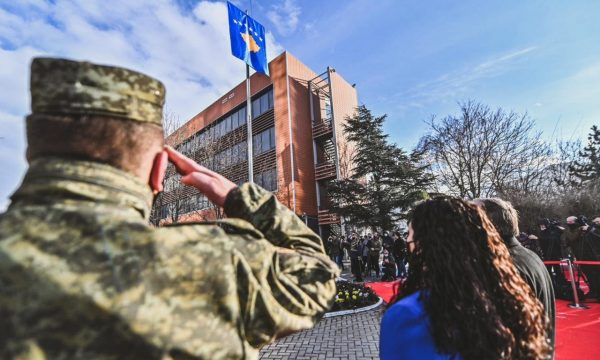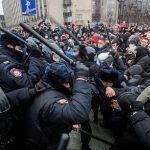Kosovo’s February 14th parliamentary elections mark a major turning point since the post-war period. Self-determination Movement (LVV) a left-wing party, emerged as the leading force in Kosovo, leaving behind the Democratic Party of Kosovo known as the war wing party and the Democratic League of Kosovo known as the non-violent party of former historic President Ibrahim Rugova, as well the oldest party in Kosovo. This victory of LVV was expected because it comes after a long journey of its leader Albin Kurti to come to a great victory like this. The pro-LVV vote is also seen as a punishment for past governments, a punishment for corruption and bad governance.
Preliminary results published on Monday by the Central Election Commission show that the LVV has won 47.85% which translates roughly to 52 seats on the 120 seat National Assembly. The Democratic Party of Kosovo 17.41% and the Democratic League of Kosovo 13.08%, the Alliance for the Future of Kosovo, AAK, received about 7.43 per cent, without counting the conditional and postal votes which are expected to increase the percentage of LVV. A great push towards the victory of LVV was given by the union of acting President of Kosovo Vjosa Osmani, who was previously part of the LDK after disagreements she had with her former party over the previous coalition with LVV.
Immediately after the announcement of the first results on the evening of February 14, the second party in the country, the Democratic Party of Kosovo, in a press conference congratulated the winner of the elections and stated that it would not cooperate with LVV to form the new government. This puts PDK for the second term in the row in the role of the opposition in Kosovo. PDK lost its two prominent leaders, former President Thaci and former Speaker of the National Assembly Veseli to the Specialized Court Chambers after the indictment was published accusing them of crimes committed post 1999. After losing almost half of its voters, LDK held an emergency meeting where its leadership resigned taking responsibility for the disaster. Isa Mustafa was former Prime Minister of Kosovo in 2014 until 2017. Last two elections, he appointed others to run for elections while retaining his party leadership.
On the 13th anniversary of its Independence, Kosovo is found with new leadership. This has raised eyebrows both in country and internationally. There is a dilemma of whether LVV and Albin Kurti as Prime Minister will lead Kosovo forward, based on his ideological actions which have produced social polarization through his exclusive narratives of state capture, corruption and nationalistic agenda. Expectations of the Kosovo citizens for the Kurti government are high, but whether he will be able to meet these challenges in this term, remains to be seen.
Challenges of the Kurti Government
Kurti’s campaign with the claims of a referendum against the “capture of the state” narratives created by LVV that the state is before collapse, was used during the campaign also by acting President Vjosa Osmani. Such terminology was used as a synonym of corruption and dysfunctional justice. Kurti went to accuse justice system for corruption, Central Elections Committee for voter suppression and even the Constitutional Court for siding with the former leadership.
Combating corruption is one of the bids Kurti has made during the campaign along with promise to eliminate dysfunctional justice. Among cases, also the war veterans who claim state benefits without merit and corrupt privatization practices. LVV has managed to convince its electorate that even the Constitutional Court is captured while most of reviews and evaluations of the Kosovo Constitutional Court are that it is neutral and one of the well-functioning institutions. Its decision upon the Constitutional Question by Kurti’s party overthrew the Hoti Government which was voted by a MP which vote was illegitimate due to an active court sentence. Same decision prevented Kurti from running in the elections due to his sentence.
Unemployment and economic development supporting the private sector. LVV comes in with large promises for Development Bank and Development Fund with privatization money as well as bringing back Kosovo Trust Fund from investments abroad. This was largely criticized by economics experts for being an insecure plan. LVV claims to help the economy but thus far, there is no clear plan on how to do that.
Foreign policy
Among the biggest challenges of the Kurti Government will be Kosovo’s foreign policy. One of the challenges ahead will be the Dialogue with Serbia continuation under auspices of the EU. Kurti has made it clear that this is not his government priority but nevertheless, this is a EU priority along with the creation of the Association of Serb municipalities in northern Kosovo. LVV has opposed both these ideas previously while taking matters in their hands even with throwing tear gas to prevent laws being approved at the National Assembly. A visit from the US Ambassador and the Letter of President Biden to acting President Osmani also reiterates the need to continue the Dialogue with Serbia to reach mutual recognition and comprehensive agreement. Kurti may have no other choice but to try to prolong and postpone these two important issues in his foreign policy because of internal pressure. On top, Kurti’s government is expected to also be the government of Visa Liberalization, conditions for which have been long fulfilled by Kosovo. But the Dialogue with Serbia is the main condition that the US and the European Union have set for Kosovo’s European perspective.
Author
-

Kosovo based analyst that focuses on current affairs, communication and technology. She studied Albanian Literature, and Economics, Management and Information Sciences. MA in Journalism and Communication. Co-authored the Worlds of Journalism Study report on Kosovo Journalists.
View all posts






